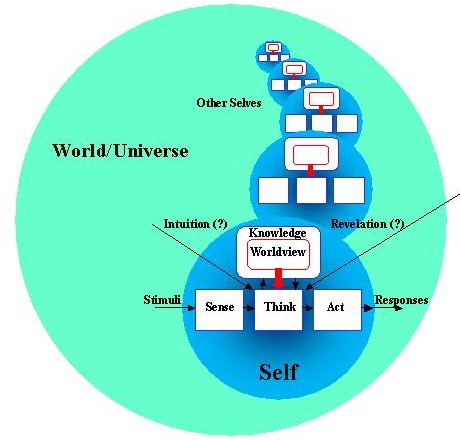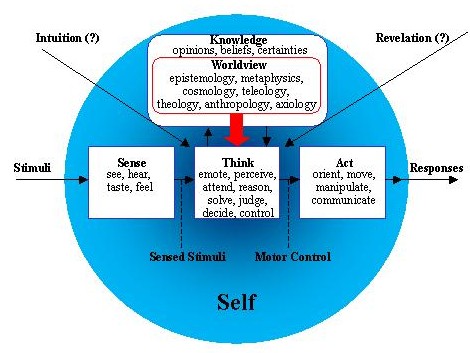Worldview in Context
Worldview in Context
Figures 1 and 2 provide a basis for a deeper understanding of worldview. The sensing, thinking, knowing, acting self exists in the milieu of a world (more accurately, a universe) of matter, energy, information and other sensing, thinking, knowing, acting selves (Figure 1). At the heart of one's knowledge is one's worldview or Weltanschauung.

Figure 1. The self and its worldview in the context of the world.
To sense is to see, hear, taste, and feel stimuli from the world and from the self (Figure 2). To act is to orient sensory organs (including eyes and ears), to move body parts, to manipulate external objects, and to communicate by speaking, writing, and other actions. Although we humans are not unique in our ability to sense and to act on our environment, it is in us, so far as we know, that thought as the basis for action is most highly developed.
Thought is a process, a sequence of mental states or events, in which sensed stimuli and existing knowledge are transformed to new or modified knowledge, some instances of which are intents that trigger motor control signals that command our muscles to action. While some actions are merely the result of sensorimotor reflexes, responses to emotions like fear or anger, or automatized patterns developed through habit, we at least like to believe that most of our actions are more reflective, being based on "higher" forms of thought.
For example, there is in most sensory experience an element of perception, in which sensed stimuli are first recognized and interpreted in light of existing knowledge (learned patterns) before they are committed to action. And to bring thought to bear on some stimuli or knowledge rather than others requires a focusing of attention, an allocation of limited mental resources to some mental activities and away from others. But it is in our reason -- and specialized forms of reason like problem solving, judging, and deciding -- that we take the most pride.
Reasoning is focused, goal-directed thought that starts from perceptions and existing knowledge and works toward new and valued knowledge. Reasoning therefore begins with knowledge and ends with knowledge, the opinions, beliefs, and certainties that one holds. By inductive reasoning (which is idealized in empirical science), one works from perceptions and other particular knowledge to more general knowledge. By deduction (exemplified by mathematical logic) further generalizations and, more practically, particular knowledge, is produced. Over a lifetime, reason builds up not only particular opinions and beliefs, but also a body of more and more basic, general, and fundamental knowledge on which the particular beliefs, and the intents for external acts, are based. This core of fundamental knowledge, the worldview, is not only the basis for the deductive reasoning that ultimately leads to action, but also is the foundation for all reasoning, providing the standards of value to establish the cognitive goals towards which reason works and to select the rules by which reason operates. The large red arrows in Figures 1 and 2 symbolize the absolutely crucial role that the worldview plays in one's behavior.

Figure 2. The worldview in the context of the self.
To put this more concisely, and consistently with the definitions considered above,
A worldview is the set of beliefs about fundamental aspects of Reality that ground and influence all one's perceiving, thinking, knowing, and doing.
One's worldview is also referred to as one's philosophy, philosophy of life, mindset, outlook on life, formula for life, ideology, faith, or even religion.
http://web.engr.oregonstate.edu/~funkk/Personal/worldview.html



 浙公网安备 33010602011771号
浙公网安备 33010602011771号